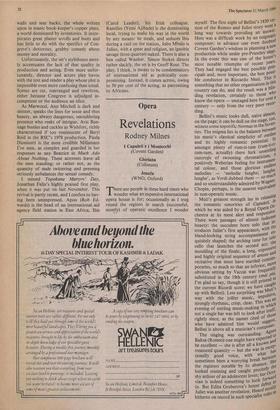Opera
Revelations
Rodney Milnes
Gloriana (Coliseum) Jenufa (WNO, Oxford)
?There are people in these hard times who 1 wonder what an expensive international opera house is for; occasionally as I trog round the regions in search (successful, mostly) of operatic excellence I wonder myself. The first night of Bellini's 1830 ver- sion of the Romeo and Juliet story went a long way towards providing an answer' Here was a difficult work by an enigmatic composer; in advance one even doubted Covent Garden's wisdom in planning anew production while under pre-Priestley siege• In the event this was one of the house's most notable triumphs of recent years. They had engaged the best possible Prin- cipals and, most important, the best possi- ble conductor in Riccardo Muti. This !S something that no other organisation in this country can do, and the result was a blin- ding revelation, certainly to those who know the opera — unstaged here for over a century — only from the very poor recor- ding. Bellini's music looks dull, naive almost, on the page; it can be dull on the stage, too, witness some soporific Norm as in the Seven- ties. The enigma lies in the balance betwe.en his music's classical simplicity of outline and its highly romantic potential.. In amongst plenty of rum-ti-turn turn-turn, actually) there lurk unsettling outcrops of swooning chromaticism, 3 positively Weberian feeling for instrumen- tat colour, and those glorious endless melodies — 'melodic lunghe, lunghe, lunghe', as Verdi dubbed them — so much and so understandably admired by Wagner' Chopin, perhaps, is the nearest equivalent in non-operatic music. Muti's greatest strength lay in releasing the romantic sonorities of Capulett, which he was aided by a Royal Opera chestra at its most alert and responsive' There were passages of almost indeee.rit beauty: the succulent horn solo that troduces Juliet's first appearance, with the bland-looking string accompaniment eg- quisitely shaped; the arching tune for s°1° cello that launches the second act; t.he moulding of the finale, a long, and highly original sequenco aerxioP sr oes asinv cie recitative that must have startled conteine poraries, so much so that an inferior, rilor obvious setting by Vaccai was frequent.1Y substituted in the 19th century (moi I'm glad to say, though it is still printeu the current Ricordi score: we have caug.Ts up with Bellini). Less surprising was !Anti way with the jollier music, irnPulsive' strongly rhythmic, crisp, clear. This was.al: c evening of sterling music-making in whie not a single bar was left to look after itseli; rightly since, as the names cited of thos. who have admired him would sugges`' Bellini is above all a musician's comPoser's The singing was outstanding. Agile° Baltsa (Romeo) one might have expected td be excellent — she is after all a known ari treasured quantity — but she was in exeeP tionally good voice, with what bc":, sometimes been a worrying break betwee4 the registers notable by its absence. Stbile looked stunning and caught preciselY shy ardour of an adolescent lover; her Oet'd vian is indeed something to look forwar_, to. But Edita Gruberova's house debut 41: Juliet was another revelation. Heard illos/ hitherto on record in such specialist roles the Queen of Night and Zerbinetta, she pro- ved to be a great deal more than a much fancied canary. Her soprano is generous in tone and under iron control from vibrant, house-filling forte to fil-di-voce pianissimo. Above and beyond extraordinary technical expertise she is a musician, sharing the honours with Muti in extracting the utmost expressive effect from those deceptively simple lines: her leading of the quintet in the first-act finale was one of many moments when one wanted time to stand Still. She has an appealing stage presence and is a natural, feeling actress. This remarkable artist, like Lucia Popp, comes from Slovakia, where they must employ nightingales as midwives. Dano Raffanti (Tybalt) has a decent, clean-limned tenor voice well suited to early ottocento opera; Gwynne Howell (Capulet) and John Tomlinson (Dr, not Friar, Lawrence in the version) completed the i cast. Pier-Luigi Pizzi's production s nondescript, as are his sets in stock 20th century operatic neo-classical style (too early for Bellini, too late for mediaeval Verona): neither get in the way of the notes. CaPuleti is bel-canto opera at its purest: everything has to be expressed through the Music. On this occasion it was, thanks to Mutt, Gruberova and Baltsa — an educa- tion as well as a revelation. All of which leaves too little space to commend the ENO's revival of Glortana, Which is in the repertory of the forthcoming ps tour. For all the care that has gone Into it, the problems won't go away. Ironically enough it is the music that Britten perhaps felt he ought to write for a coronation °Dem that gets in the way — the masques, the fanfares, the ceremonial. It is all ex- cellent of its kind, but it loosens the focus on one of his characteristically doomed relationships, that between the ageing Queen and the ambitious Essex. When either is on stage one is gripped, when not, rlot.Sarah Walker, while not entirely over- corning the difficulty involved in a young artist impersonating an old woman trying to look young, sings the role with her Customary intelligence, and Anthony Rolfe Johnson's Essex is unbeatable. With every role cast from strength and Mark Elder's in- cisive conducting making the best possible Case for the score, the revival certainly Shows the company off at its best. The WNO's current revival of Jenufa reverts, for the first time on stage in this cou . ntrY, to Janacek's original orchestra- tion. This too is a revelation: with excess in- strumental fat removed the score is tauter, r ither, much more the Janacek we know, especially as conducted by Richard Arm- strong. sinew, not flesh. We never need to bear. Kovarovic's well-meaning touching up aP1,11, any more than we need to hear Rim- sKY s.Boris. David Pountney's production, dramatic LY adapted, remains full of _ r.amatic insight, and the cast boasts Helen Field s disturbingly physical Jenufa, Jeffrey _Lawton's intelligently sung Laca and Cannan's hair-raising Kostelnicka. trnmently worth trogging off to the regions to Catch.















































 Previous page
Previous page